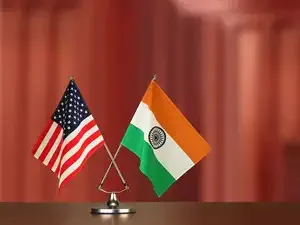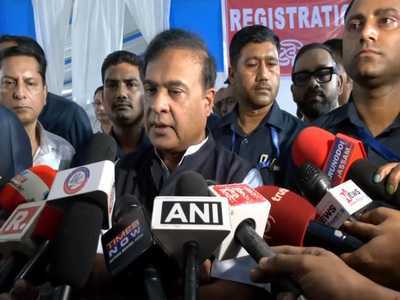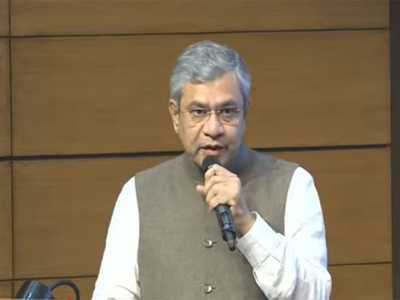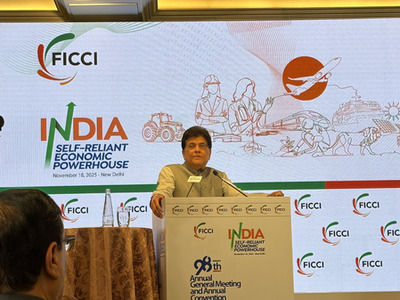A resolution calling for stronger ties between India and the United States has received strong bipartisan support in the US Congress, boosting hopes of speedy removal of high tariffs and conclusion of the first phase of the proposed bilateral trade deal.
The resolution, introduced in the House of Representatives by Ami Bera and Joe Wilson, underscored decades of deepening cooperation between two of the world’s largest democracies across critical sectors including defence, technology, trade, counterterrorism, and education. It also highlights India’s vital role in promoting regional stability, economic growth, and a free and open Indo-Pacific.
It has attracted 24 original cosponsors, spanning both Republicans and Democrats, including Sydney Kamlager-Dove, Rich McCormick, Deborah Ross, Rob Wittman, Josh Gottheimer, James Moylan, Brad Schneider, Young Kim, Sanford Bishop, Buddy Carter, Shri Thanedar, David Schweikert, Raja Krishnamoorthi, Michael Baumgartner, Suhas Subramanyam, Bill Huizenga, Brad Sherman, Don Bacon, Marc Veasey, Andy Barr, Ed Case, and Jay Obernolte.
The resolution drew attention to India’s contribution to regional stability, economic growth, and a free and open Indo-Pacific.
“For more than three decades, it has been the policy of the United States under administrations of Presidents Clinton, Bush, Obama, Trump, and Biden to strengthen the strategic partnership with India, recognising its importance to regional stability, democratic governance, economic growth, and shared regional priorities,” it said.
It recalled key milestones in the relationship, including the 2004 Next Step in Strategic Partnership, which opened cooperation in civilian nuclear energy, defence, and high technology, and the 2005 Civil Nuclear Cooperation statement that led to the Henry J Hyde United States-India Peaceful Atomic Energy Cooperation Act of 2006, and the United States-India 123 Agreement in 2003.
The resolution also noted the contribution of people-to-people ties and educational exchanges, particularly those strengthened by the Indian American diaspora.
It further highlighted that Prime Minister Narendra Modi has twice addressed joint meetings of Congress – in 2016 under Speaker Paul D Ryan and in 2023 under Speaker Kevin McCarthy – reflecting bipartisan backing for the partnership.
The resolution encouraged expanded engagement through the Quad, increased participation in economic initiatives, and deeper defence, commercial, and investment ties.
It also called for continued counterterrorism cooperation, including the swift prosecution of the perpetrators of the 2008 Mumbai terror attacks.
The resolution affirms the importance of technology collaboration through initiatives such as the United States-India Transforming the Relationship Utilising Strategic Technology and highlights the need to expand people-to-people programmes, especially between educational institutions. It expresses appreciation for the contributions of the Indian American diaspora and the aim for closer relations between the two nations.
The resolution, introduced in the House of Representatives by Ami Bera and Joe Wilson, underscored decades of deepening cooperation between two of the world’s largest democracies across critical sectors including defence, technology, trade, counterterrorism, and education. It also highlights India’s vital role in promoting regional stability, economic growth, and a free and open Indo-Pacific.
It has attracted 24 original cosponsors, spanning both Republicans and Democrats, including Sydney Kamlager-Dove, Rich McCormick, Deborah Ross, Rob Wittman, Josh Gottheimer, James Moylan, Brad Schneider, Young Kim, Sanford Bishop, Buddy Carter, Shri Thanedar, David Schweikert, Raja Krishnamoorthi, Michael Baumgartner, Suhas Subramanyam, Bill Huizenga, Brad Sherman, Don Bacon, Marc Veasey, Andy Barr, Ed Case, and Jay Obernolte.
The resolution drew attention to India’s contribution to regional stability, economic growth, and a free and open Indo-Pacific.
“For more than three decades, it has been the policy of the United States under administrations of Presidents Clinton, Bush, Obama, Trump, and Biden to strengthen the strategic partnership with India, recognising its importance to regional stability, democratic governance, economic growth, and shared regional priorities,” it said.
It recalled key milestones in the relationship, including the 2004 Next Step in Strategic Partnership, which opened cooperation in civilian nuclear energy, defence, and high technology, and the 2005 Civil Nuclear Cooperation statement that led to the Henry J Hyde United States-India Peaceful Atomic Energy Cooperation Act of 2006, and the United States-India 123 Agreement in 2003.
The resolution also noted the contribution of people-to-people ties and educational exchanges, particularly those strengthened by the Indian American diaspora.
It further highlighted that Prime Minister Narendra Modi has twice addressed joint meetings of Congress – in 2016 under Speaker Paul D Ryan and in 2023 under Speaker Kevin McCarthy – reflecting bipartisan backing for the partnership.
The resolution encouraged expanded engagement through the Quad, increased participation in economic initiatives, and deeper defence, commercial, and investment ties.
It also called for continued counterterrorism cooperation, including the swift prosecution of the perpetrators of the 2008 Mumbai terror attacks.
The resolution affirms the importance of technology collaboration through initiatives such as the United States-India Transforming the Relationship Utilising Strategic Technology and highlights the need to expand people-to-people programmes, especially between educational institutions. It expresses appreciation for the contributions of the Indian American diaspora and the aim for closer relations between the two nations.








